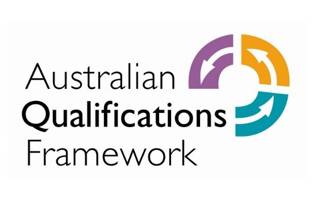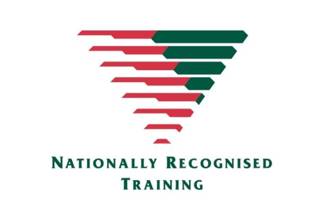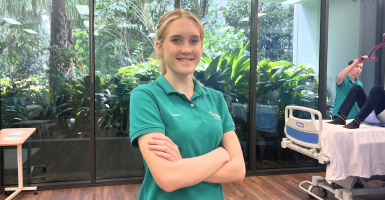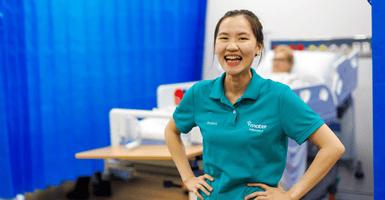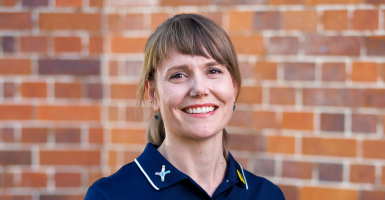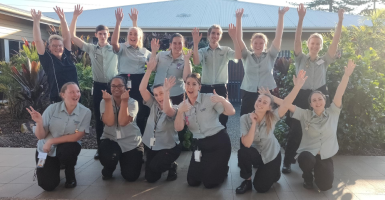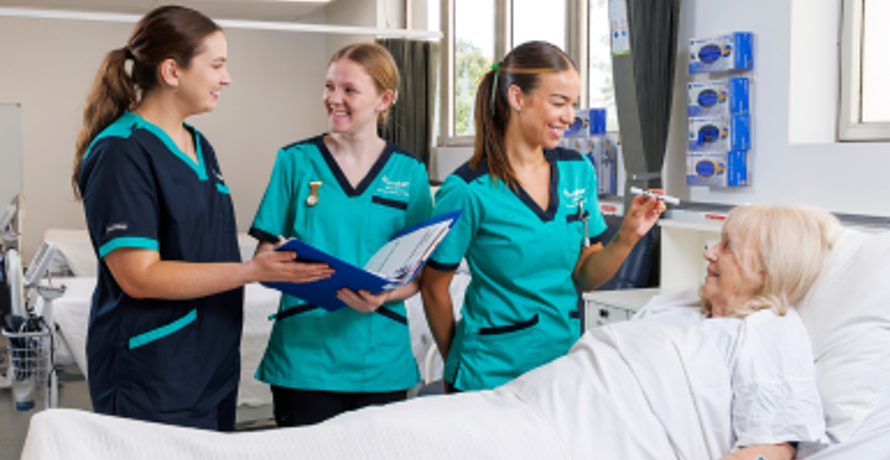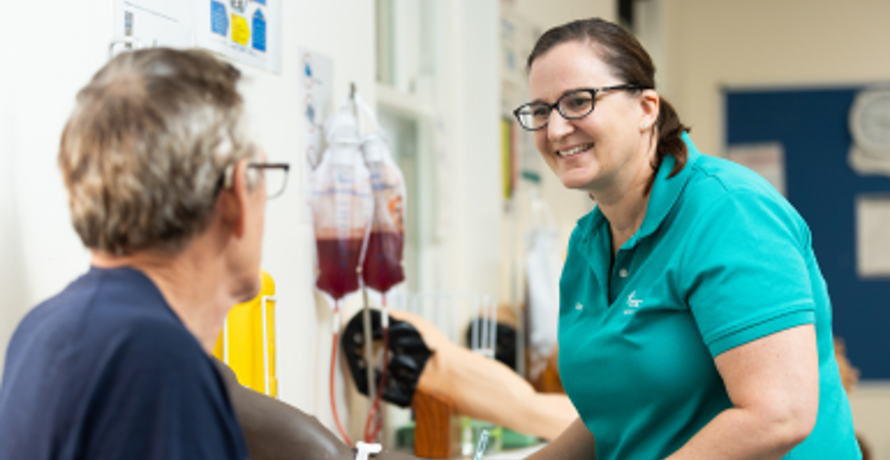Certificate IV in Allied Health Assistance
HLT43021
Get qualified to work in a dynamic allied health environment in just six months
Study a Certificate IV in Allied Health Assistance with Mater Education! Learn from expert Mater Educators and study in a hospital-based, simulated ward.
Gain a nationally-recognised qualification and learn how to provide therapeutic and program related support activities under the guidance of allied health professionals. Work in a variety of settings, including:
- Physiotherapy
- Occupational therapy
- Rehabilitation
- Community services
Undertake 120 hours of organised placement, where you’ll have the opportunity to practice your knowledge in a real healthcare environment. For more information on the available funding options and criteria please see the costs section on this page.
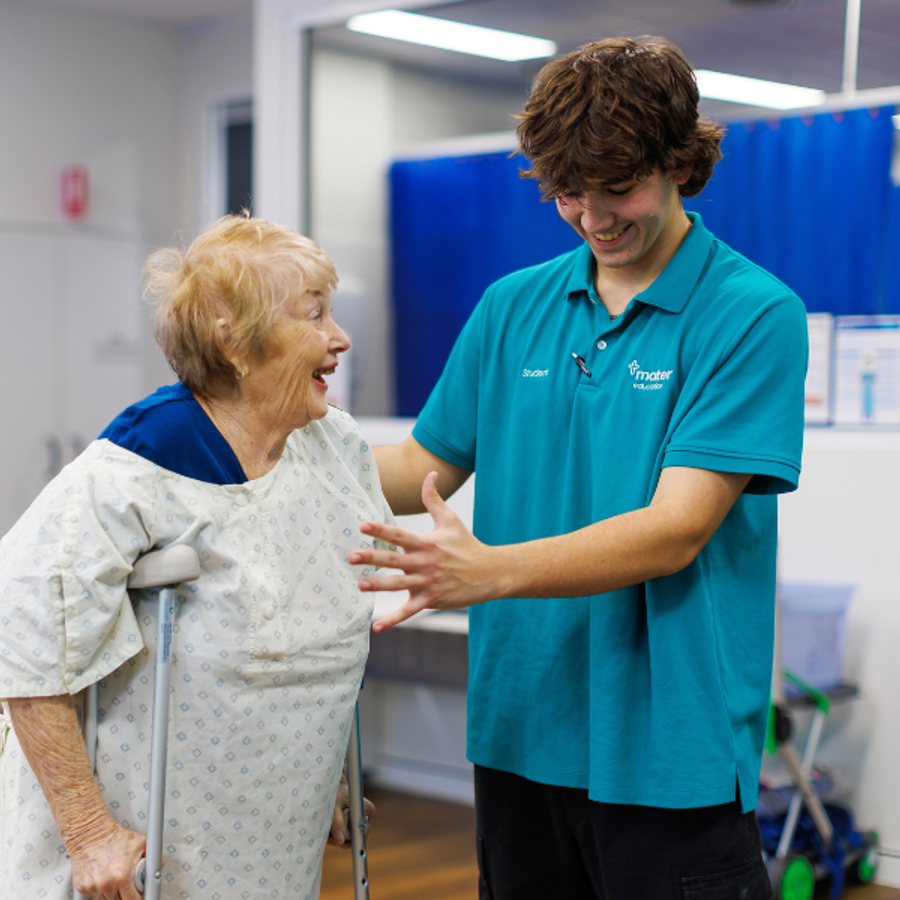
Career pathways
After completing the course, you will be qualified to work as a:
- Therapy assistant
- Physiotherapy assistant
- Occupational therapy assistant
- Allied health assistant
They contribute to service delivery and assist allied health professionals to deliver healthcare to individuals or via group sessions. Allied health assistants work under the supervision and delegation of health professionals.
This course will qualify you to work as an allied health assistant or give you the skills needed to further your studies.
Course information
-
Mater Education's hands-on training will prepare you to hit the ground running in your allied health career.
To enrol in the course, you are required to submit an online application including:
addressing the following three criteria:
What motivates you to pursue a career in healthcare at this time?
Why do you think the Mater Education program would suit you?
How do you plan to balance your life, work and full-time study commitments while undertaking the allied health assistance program?
details of your work history and voluntary experience
details of any prior education, including copies of any qualifications, statements of attainment or a transcript of completed study and/or your Senior Secondary Certificate of Education awarded for the completion of year 12.
You must be 18 years of age to enrol in this course.
Selection
Applicants that address the defined criteria as published and whose answers are clear and informative will progress to the next stage.
To set you up for success, we'll ask you to undergo a language, literacy and numeracy (LLN) evaluation before starting the program. The LLN evaluation will give us an insight into your reading, writing and numeracy skills, and help us plan any extra support you may need to succeed in the program.
Applicants who display competence at or above Exit Level 2 in the Australian Core Skills Framework (ACSF) across all five core skills of learning, reading, writing, oral communication and numeracy will be invited to an interview.
To be an allied health assistant you need to be responsible, physically fit, mentally alert and practical. You also need to be able to carry out all the physical activities required to care for a patient.
Certificates and permits
Obtain a criminal history check prior to workplace experience placement.
Students who complete their workplace experience placement in a child related area will also be required to obtain a Blue Card. This is free for students and will be discussed at the interview stage.
If you have any questions about Blue Card requirements, please contact us.
Immunisations
You also need to provide proof of immunity (or that you’ve started vaccination) for the following communicable diseases:
- Hepatitis B
- Varicella (chicken pox)
- MMR (measles, mumps and rubella)
- Pertussis (whooping cough)
- Seasonal vaccinations (influenza) as required.
Resources
Students will require a reliable internet connection enabling access to Mater Education’s virtual learning environment, and a laptop with up-to-date software, including Microsoft Office, Adobe Acrobat Reader and Adobe Flash Player.
-
Full fee-paying student - $7,990
View the schedule of fees for students in 2025.
Tertiary Access Payment
Students may also be able to access Tertiary Access Payment, a payment to help with the cost of moving from regional or remote areas for tertiary study. To find out more, visit the Services Australia website.
Additional costs
As part of your enrolment, you will need to buy:
- Mater Education Uniform shirt (approximately $60 - $80 per shirt)
- Closed-in black shoes
- Black business pants or knee-length black skirt (preferably with pockets)
- Criminal history check 'Fit2Work' ($29)
- Any additional vaccinations you may require
- Laptop or portable device with internet access
Cancellation and refund policy.
-
This course will take six months including placement to complete. Classes will be hybrid in delivery, including both:
- Onsite: Delivered at Mater Education campus (Two days per week*).
- Online: Theory sessions and tutorials delivered online (est. 10 hours per week).
Within these modes, a range of class styles are utilised, including classroom work, group discussions, tutorials, online videos, online sessions and practical simulation events.
Training times
- Mater Education delivers classes between the hours of 8am and 6pm.
- Classes are typically between Monday to Friday.
- Students will be provided with a timetable for each term to assist in planning ahead for their training upon commencement.
Class timetables
View the indicative timetables and study expectation for students commencing study in:
-
This qualification comprises 18 units in total, including 10 core units and eight elective units.
Core unitsBSBMED301 - Interpret and apply medical terminology appropriately
This unit describes the skills and knowledge required to understand and respond to instructions; to carry out routine tasks and communicate with a range of internal/external clients in a medical environment; as well as use appropriate medical terminology.
CHCCCS020 - Respond effectively to behaviours of concern
This unit describes the skills and knowledge required to respond effectively to people with behaviours of concern. Skills are associated with handling difficult incidents rather than managing ongoing behaviour difficulties.
CHCCCS036 - Support relationships with carer and family
This unit describes the performance outcomes, skills and knowledge required to work positively with the carer and family of people using a service based on an understanding of their support needs.
CHCCCS038 - Facilitate the empowerment of people receiving support
This unit describes the performance outcomes, skills and knowledge required to facilitate the empowerment of people receiving support, and to deliver rights-based services using a person-centred approach. It should be carried out in conjunction with individualised plans.
CHCDIV001 - Work with diverse people
This unit describes the skills and knowledge required to work respectfully with people from diverse social and cultural groups and situations, including Aboriginal and/or Torres Strait Islander people.
HLTAHA027 - Assist with an allied health program
This unit describes the skills and knowledge required to provide assistance to an Allied Health Professional. Work includes following treatment plans for therapeutic interventions or conducting programs.
HLTAHA047 - Engage with clinical supervision and delegation
This unit describes the skills and knowledge required to provide assistance to an Allied Health Professional. Work includes preparing for and participating in a structured process of clinical supervision and receiving delegations.
HLTAHA049 - Recognise impact of health conditions
This unit describes the skills and knowledge required to recognise the impact of health conditions of a person undertaking an intervention or therapy program. Work includes using a basic understanding of the human body to assist in interpreting information about person's health status to promote ways to maintain a healthy functioning of the body.
HLTINF006 - Apply basic principles and practices of infection prevention and control
This unit describes the performance outcomes, skills and knowledge required to apply basic infection prevention and control principles in work settings including implementing standard and transmission-based precautions and responding to risks.
HLTWHS002 - Follow safe work practices for direct client care
This unit describes the skills and knowledge required for a worker to participate in safe work practices to ensure their own health and safety, and that of others in work environments that involve caring directly for clients. It has a focus on maintaining safety of the worker, the people being supported and other community members.
Electives
CHCCCS002 - Assist with movement
This unit describes the skills and knowledge required to support people who require assistance with basic physical movement which may be due to incapacity.
HLTAHA028 - Delivery and monitor physical or manual therapy program
This unit describes the skills and knowledge required to provide assistance to a registered Allied Health Professional. Work includes supporting individuals or a group of individuals participating in physical or manual therapy programs.
HLTAHA032 - Support maintenance of functional status
This unit describes the skills and knowledge required to provide assistance to an Allied Health Professional. Work includes supporting the individual to participate in developmental activities that will enhance or maintain functional status.
HLTAHA031 - Assist in rehabilitation programs
This unit describes the skills and knowledge required to provide assistance to an Allied Health Professional. Work includes receiving and responding to rehabilitation programs developed by Allied Health Professionals.
HLTAHA033 - Conduct group sessions for individual outcomes
This unit describes the skills and knowledge required to provide assistance to an Allied Health Professional. Work includes planning, preparing and implementing group activities to meet individual outcomes.
CHCAGE007 - Recognise and report risk of falls
This unit describes the performance outcomes, skills and knowledge required to work in partnership with a person and their family, carer or others identified by the person to recognise and report the risk of falls.
CHCAGE008 - Implement falls prevention strategies
This unit describes the performance outcomes, skills and knowledge required to work in partnership with a person and their family, carer or others identified by the person to implement strategies to minimise the risk of falls, according to an individualised plan.
HLTAID011 – Provide First aid
This unit describes the skills and knowledge required to provide a first aid response to a casualty in line with first aid guidelines determined by the Australian Resuscitation Council (ARC) and other Australian national peak clinical bodies.
Should you leave the course before you complete it, you’ll receive a Statement of Attainment for any units of competency you’ve successfully completed and where fees have been paid in full.
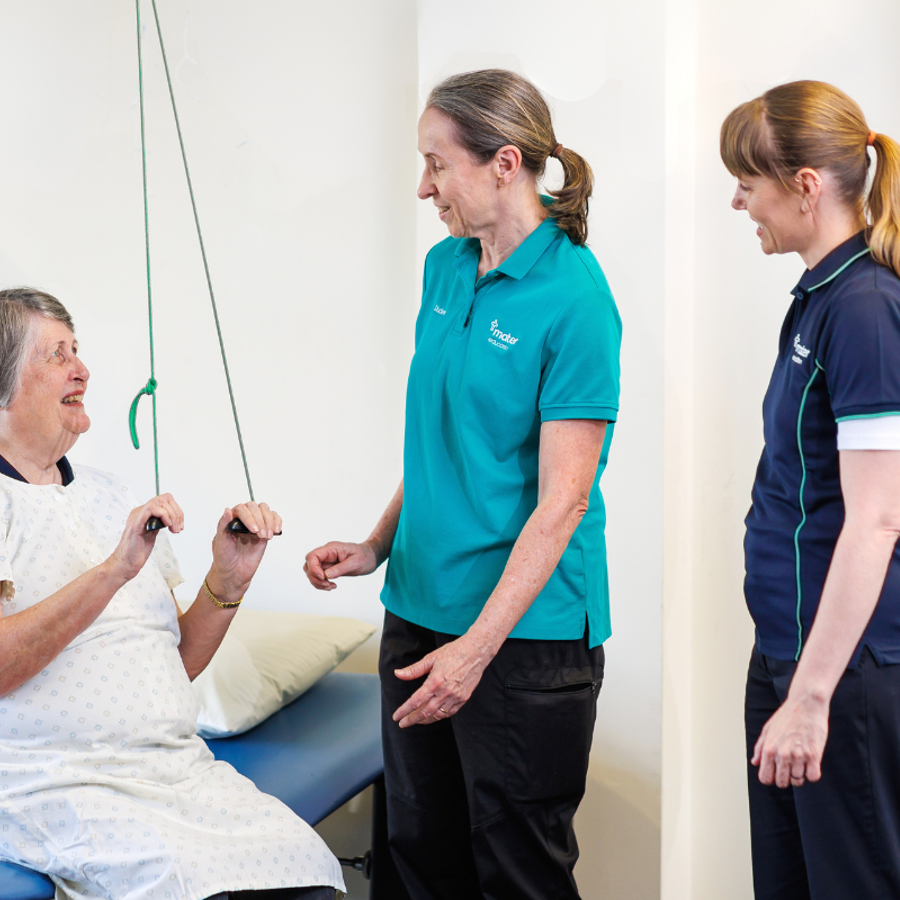
Placement
Mater Education has a dedicated placement team who will plan for your mandatory placement as part of this course. You can undertake workplace experience placement in specialities including:
- physiotherapy
- occupational therapy
- rehabilitation
- community services.
Want to find out more about this course?
Related courses
-
 Brisbane
Brisbane
Springfield & Townsville18 monthsDiploma of Nursing
Gain the skills and knowledge you need to become an Enrolled Nurse (EN) with Mater Education’s Diploma of Nursing program.
-
 Springfield
Springfield
Brisbane15 weeks plus placementCertificate III in Pathology Collection
Our Certificate III in Pathology Collection course will arm you with the skills, knowledge and practical experience you need to become a pathology collector.

